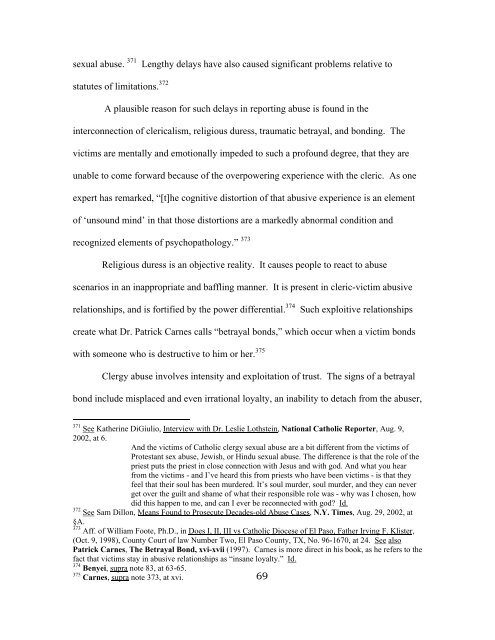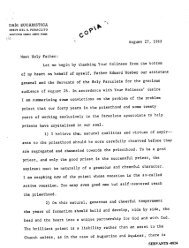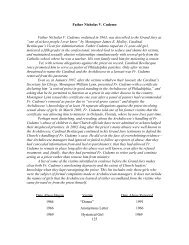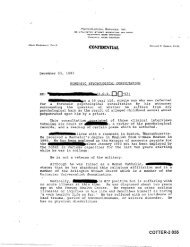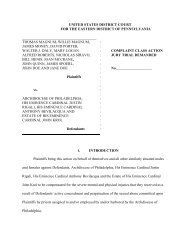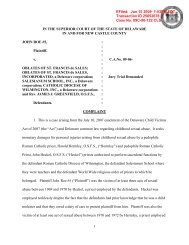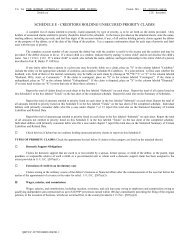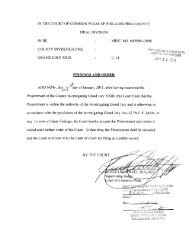1 1 Catholic Clergy Sexual Abuse Meets the Civil Law by Thomas P ...
1 1 Catholic Clergy Sexual Abuse Meets the Civil Law by Thomas P ...
1 1 Catholic Clergy Sexual Abuse Meets the Civil Law by Thomas P ...
Create successful ePaper yourself
Turn your PDF publications into a flip-book with our unique Google optimized e-Paper software.
sexual abuse. 371 Lengthy delays have also caused significant problems relative to<br />
statutes of limitations. 372<br />
A plausible reason for such delays in reporting abuse is found in <strong>the</strong><br />
interconnection of clericalism, religious duress, traumatic betrayal, and bonding. The<br />
victims are mentally and emotionally impeded to such a profound degree, that <strong>the</strong>y are<br />
unable to come forward because of <strong>the</strong> overpowering experience with <strong>the</strong> cleric. As one<br />
expert has remarked, “[t]he cognitive distortion of that abusive experience is an element<br />
of ‘unsound mind’ in that those distortions are a markedly abnormal condition and<br />
recognized elements of psychopathology.” 373<br />
Religious duress is an objective reality. It causes people to react to abuse<br />
scenarios in an inappropriate and baffling manner. It is present in cleric-victim abusive<br />
relationships, and is fortified <strong>by</strong> <strong>the</strong> power differential. 374 Such exploitive relationships<br />
create what Dr. Patrick Carnes calls “betrayal bonds,” which occur when a victim bonds<br />
with someone who is destructive to him or her. 375<br />
<strong>Clergy</strong> abuse involves intensity and exploitation of trust. The signs of a betrayal<br />
bond include misplaced and even irrational loyalty, an inability to detach from <strong>the</strong> abuser,<br />
371<br />
See Ka<strong>the</strong>rine DiGiulio, Interview with Dr. Leslie Lothstein, National <strong>Catholic</strong> Reporter, Aug. 9,<br />
2002, at 6.<br />
And <strong>the</strong> victims of <strong>Catholic</strong> clergy sexual abuse are a bit different from <strong>the</strong> victims of<br />
Protestant sex abuse, Jewish, or Hindu sexual abuse. The difference is that <strong>the</strong> role of <strong>the</strong><br />
priest puts <strong>the</strong> priest in close connection with Jesus and with god. And what you hear<br />
from <strong>the</strong> victims - and I’ve heard this from priests who have been victims - is that <strong>the</strong>y<br />
feel that <strong>the</strong>ir soul has been murdered. It’s soul murder, soul murder, and <strong>the</strong>y can never<br />
get over <strong>the</strong> guilt and shame of what <strong>the</strong>ir responsible role was - why was I chosen, how<br />
did this happen to me, and can I ever be reconnected with god? Id.<br />
372<br />
See Sam Dillon, Means Found to Prosecute Decades-old <strong>Abuse</strong> Cases, N.Y. Times, Aug. 29, 2002, at<br />
§A.<br />
373<br />
Aff. of William Foote, Ph.D., in Does I, II, III vs <strong>Catholic</strong> Diocese of El Paso, Fa<strong>the</strong>r Irving F. Klister,<br />
(Oct. 9, 1998), County Court of law Number Two, El Paso County, TX, No. 96-1670, at 24. See also<br />
Patrick Carnes, The Betrayal Bond, xvi-xvii (1997). Carnes is more direct in his book, as he refers to <strong>the</strong><br />
fact that victims stay in abusive relationships as “insane loyalty.” Id.<br />
374<br />
Benyei, supra note 83, at 63-65.<br />
375<br />
Carnes, supra note 373, at xvi.<br />
69


